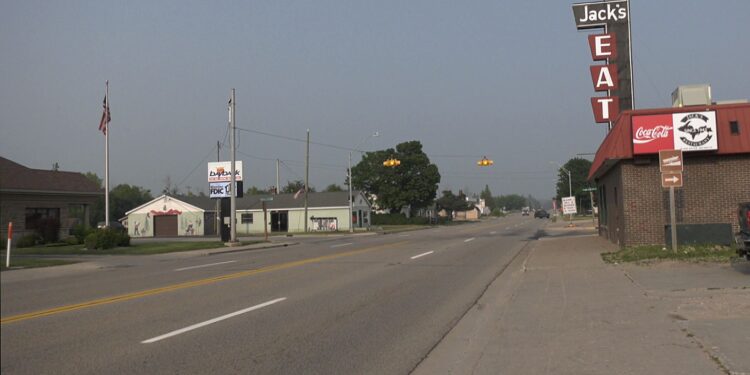RAPID RIVER, Mich. (WZMQ) – This week, the Rapid River Business Association met with a Ford Pro representative to discuss a potential future for electric vehicles in the town.
“All you have to do is look at the air quality and know that things are just not the way they used to be,” said Ford Pro Assistant Brand Manager Christian Kreipke. “One of the ways that we can do this is transition from ICE–or internal combustion engines that utilize gas–into electric vehicles, which have zero emissions.”
According to Kreipke, the challenge for electric vehicle owners driving through the U.P. is the long distance between charging stations. Ford is looking to establish more charging stations in small towns like Rapid River.
“The main highway to get you from the East Coast of the United States all the way to Spokane, Washington cuts right through the middle of town,” Kreipke said. “You’ve got to go through Rapid River to get anywhere you want to go in the U.P., or frankly, even in the nation.”
Rapid River would also receive a facelift to make the town as attractive as possible to drivers stopping to charge their vehicles. Kreipke says that would include updating old buildings, utilizing empty spaces, and possibly moving some businesses. He says Ford aims to protect businesses during the process. Kreipke, who grew up in the area, says he also understands the importance of making sure Rapid River stays the same small town locals know and love.
“The whole concept here is not to transform a town into some ultra-modern space or to change buildings or anything,” he said. “It’s just to show that between getting in more tourists that utilize the chargers or even the local residents, we can revitalize a town to take what they have as their best assets and capitalize on those.”
During the Business Association’s meeting with Kreipke, local business owners weighed in on the matter with their questions, concerns, and ideas. Sierra Hatten and Sam Kohnert, owners of Tuck’s Auto Repair, were especially interested in learning more about the logistics of bringing in electric vehicle charging stations to the area.
“One of our biggest concerns was, what does that look like for Tuck’s Auto?” Hatten said. “Where are the charging ports going to go? Who manages them? I feel like everybody is mostly on board, and we are too. We just want to see a bigger picture.”
If the community decides to move forward with the charging stations and renovation, it would be proposed to the Ford Fund. Projects of this scale typically cost around $25 million according to Kreipke, although he says it is too early to give an exact amount.
“It’s an amalgamation of once one person sees the vision, other people start adding on and adding on,” he said of the funding process. “It would basically be through grants and charitable organizations and trusts.”
Rapid River business owners and residents are invited to attend the Business Association’s next meeting with Kreipke on Tuesday, July 25 at the Omni Center. Kreipke encourages attendees to compile a list of questions and thoughts in preparation for the meeting.









